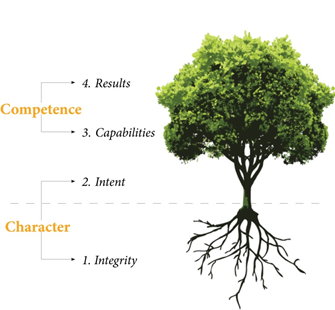Credibility boils down to two simple questions. First, do I trust myself? Second, am I someone who others can trust?
From these questions we get the 4 cores, which are key to building credibility.
- The Four Cores are:
- 1. Integrity,
- 2. Intent,
- 3. Capabilities, and
- 4. Results
Integrity and Intent are character cores. Capabilities and Results are competency cores. All Four Cores are necessary for credibility. A person of integrity that does not produce results is not credible. If you are not credible, you are not trustworthy!
1. Integrity
The First Core is Integrity. Most of the major violations of trust are violations of integrity. Integrity is more than honesty. In addition to honesty, integrity is made up of three other virtues.
Congruency is when one acts according to his values. It is when there is no gap between what one intends to do and what one actually does.
Humility is the ability to look out for the good of others in addition to what is good for you. A humble person is more concerned about what is right than about being right, about acting on good ideas than about having the ideas, about embracing new truth than defending an outdated position, about building the team than exalting self, about recognizing contribution than being recognized for it.
Courage is the ability to do the right thing even when it may be difficult. It is when you do what you know is right regardless of the possible consequences.
2. Intent:
The Second Core is Intent. Intent springs from our character. It is part of our value system. It is how we know we should act. Intent can be broken down to three things.
Motive is why you do what you do. The best motive in building trust is genuinely caring about people. If you don’t care and have no desire to care, be honest and let people know you don’t care. If you don’t care but want to care, start to do caring things. Often, the feelings will follow the actions.
Agenda stems from our motive. The best agenda is honestly seeking what is good for others. Notice that your agenda is much more than wanting what is good for others, but seeking what is good for others.
Behavior is putting your agenda into practice. It is what we do based upon what we intend to do and what we are actively seeking. Behavior is where the rubber meets the road. Behavior is important because it is what people see and judge. Telling someone you love them is important, but showing them you love them is essential.
Three suggestions to improve intent. First, examine and refine your motives. Second, declare your intent. Third, choose abundance.
3. Capabilities:
The Third Core is Capabilities. Capabilities are “the talents, skills, knowledge, capacities and abilities that we have that enable us to perform with excellence.” To help think about the various dimensions of capabilities, following is an acronym TASKS: Talents, Attitude, Skills, Knowledge, and Style.
Talents are the things we naturally do well. These are the things we usually love to do. Your attitude is how you see things. It is how we are inside. Skills are the things you have learned to do well. It is easy to get so comfortable with our skills that we never fulfill our talents. He suggests that talent is a deeper well than skill. Knowledge is what you know and continue to learn. Style is your unique way of doing things. It involves your personality.
How to Increase Your Capabilities: First, follow your strengths and your passions. Second, remain relevant by continually increasing your knowledge and improving your skills. Third, know where you are going. The people you lead will follow if you know where you are going.
4. Results
The Fourth Core is Results. People don’t trust people who don’t deliver results. Results are the deliverables. They are what you contribute to the company. You can’t hide from your results. If the results aren’t there, neither is the credibility. Neither is the trust. It’s just that simple; it’s just that harsh.”
There are three areas of results people look at to judge your credibility. First, your past results: what you have proven you can do. Second, your current results: what you are contributing right now. Third, your potential results: what people anticipate you will accomplish in the future.
How to improve your results: First, take responsibility for results, not activity. Second, expect to achieve your goals. Assume you will be successful. This assumption will translate into action. Third, finish strong. “Results are all about finishing. You are probably aware of the old adage; Beginners are many; finishers are few.”


 Comments
Comments





Leave A Comments